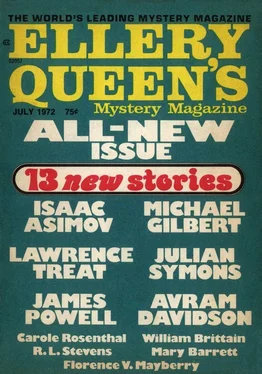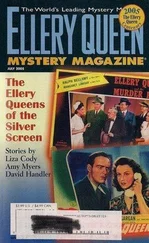Ellery Queen’s Mystery Magazine, Vol. 60, No. 1. Whole No. 344, July 1972
Здесь есть возможность читать онлайн «Ellery Queen’s Mystery Magazine, Vol. 60, No. 1. Whole No. 344, July 1972» весь текст электронной книги совершенно бесплатно (целиком полную версию без сокращений). В некоторых случаях можно слушать аудио, скачать через торрент в формате fb2 и присутствует краткое содержание. Город: New York, Год выпуска: 1972, Издательство: Davis Publications, Жанр: Классический детектив, на английском языке. Описание произведения, (предисловие) а так же отзывы посетителей доступны на портале библиотеки ЛибКат.
- Название:Ellery Queen’s Mystery Magazine, Vol. 60, No. 1. Whole No. 344, July 1972
- Автор:
- Издательство:Davis Publications
- Жанр:
- Год:1972
- Город:New York
- ISBN:нет данных
- Рейтинг книги:4 / 5. Голосов: 1
-
Избранное:Добавить в избранное
- Отзывы:
-
Ваша оценка:
- 80
- 1
- 2
- 3
- 4
- 5
Ellery Queen’s Mystery Magazine, Vol. 60, No. 1. Whole No. 344, July 1972: краткое содержание, описание и аннотация
Предлагаем к чтению аннотацию, описание, краткое содержание или предисловие (зависит от того, что написал сам автор книги «Ellery Queen’s Mystery Magazine, Vol. 60, No. 1. Whole No. 344, July 1972»). Если вы не нашли необходимую информацию о книге — напишите в комментариях, мы постараемся отыскать её.
Ellery Queen’s Mystery Magazine, Vol. 60, No. 1. Whole No. 344, July 1972 — читать онлайн бесплатно полную книгу (весь текст) целиком
Ниже представлен текст книги, разбитый по страницам. Система сохранения места последней прочитанной страницы, позволяет с удобством читать онлайн бесплатно книгу «Ellery Queen’s Mystery Magazine, Vol. 60, No. 1. Whole No. 344, July 1972», без необходимости каждый раз заново искать на чём Вы остановились. Поставьте закладку, и сможете в любой момент перейти на страницу, на которой закончили чтение.
Интервал:
Закладка:
“Do you know him?”
“I heard his name for the first time at about ten o’clock last night.”
“In that case,” said Mr. Behrens, “according to the fantastic rules propounded and believed in by you, you will hear it again before ten o’clock this evening.”
It was at this precise moment that the telephone rang.
Since Mr. Calder’s telephone number was not only unlisted but changed every six months, his incoming calls were likely to be matters of business. He was not surprised, therefore, to recognize the voice of Mr. Fortescue, who was the Manager of the Westminster Branch of the London and Home Counties Bank, and other things besides.
Mr. Fortescue said, “I’d like to see you and Behrens as soon as possible. Shall we say, tomorrow afternoon?”
“Certainly,” said Mr. Calder. “Can you give me any idea what it’s about?”
“You’ll find it all in your Observer. An article about a clergyman who performs miracles. Francis Osbaldestone.”
“Ah!” said Mr. Calder.
“You sound pleased about something,” said Mr. Fortescue suspiciously.
Mr. Calder said, “You’ve just proved a theory.”
“I understand,” said Mr. Fortescue, “that you knew Colonel Faulkner quite well, in the army.”
“He was my Company Commander,” said Mr. Calder.
“Would you say he was an imaginative man?”
“I should think he’s got about as much imagination as a Number Eleven bus.”
“Or a man who would be easily deluded?”
“I’d hate to try.”
Mr. Fortescue pursed his lips primly and said, “That was my impression, too. Do you know Hedgeborn?”
“Not the village. But I know that part of Norfolk. It’s fairly primitive. The army had a battle school near there during the war. They were a bit slow about handing it back, too.”
“I seem to remember,” said Mr. Behrens, “that there was a row about it. Questions in Parliament. Did they give it back in the end?”
“Most of it. They kept Snettisham Manor, with its park. After all the trouble at Porton Experimental Station they moved the poison gas section down to Cornwall and transferred the Bacterial Warfare Wing to Snettisham, which is less than two miles from Hedgeborn.”
“I can understand,” said Mr. Calder, “that Security would keep a careful eye on an establishment like Snettisham. But why should they be alarmed by a saintly rector two miles down the valley?”
“You are not aware of what happened last week?”
“Ought we to be?”
“It has been kept out of the press, but it’s bound to leak out sooner or later. Your saintly rector led what I can only describe as a village task force. It was composed of the members of the Parochial Church Council and two dozen or so of the villagers and farmers. They broke into Snettisham Manor.”
“But, good God,” said Mr. Calder, “the security arrangements must have been pretty ropey.”
“The security was adequate. A double-wire fence, patrolling guards and dogs. The village blacksmith cut the fence in two places. A farm tractor dragged it clear. They had no trouble with the guards, who were armed only with truncheons. The farmers had shotguns.”
“And the dogs?”
“They made such a fuss over the rector that he was, I understand, in some danger of being licked to death.”
“What did they do when they got in?” said Behrens.
“They broke into the experimental wing and liberated twenty rabbits, a dozen guinea pigs, and nearly fifty rats.”
Mr. Behrens started to laugh, but managed to turn it into a cough when he observed Mr. Fortescue’s eyes on him.
“I hope you don’t think it was funny, Behrens. A number of the rats had been infected with Asiatic plague. They hope they recaptured or destroyed the whole of that batch.”
“Has no action been taken against the rector?”
“Naturally. The police were informed. An Inspector and a Sergeant drove over from Thetford to see the rector. They were refused access.”
“Refused?”
“They were told,” said Mr. Fortescue gently, “that if they attempted to lay hands on the rector they would be resisted — by force.”
“But surely—” said Mr. Behrens. And stopped.
“Yes,” said Mr. Fortescue. “Do think before you say anything. Try to visualize the unparalleled propaganda value to our friends in the various C.N.D. and Peace Groups if an armed force had to be dispatched to seize a village clergyman.”
Mr. Behrens said, “Pm visualizing it. Do you think one of the more enterprising bodies — the International Brotherhood Group occurs to me as a possibility — might have planted someone in Hedgeborn? Someone who is using the rector’s exceptional influence—”
“It’s a possibility. You must remember that the Bacterial Warfare Wing has only been there for two years. If anyone has been planted, it has been done comparatively recently.”
“How long has the rector been there?” said Mr. Calder.
“For eighteen months.”
“I see.”
“The situation is full of possibilities, I agree. I suggest you tackle it from both ends. I should suppose, Behrens, that there are few people who know more about the International Brotherhood Group and its ramifications than you do. Can you find out whether they have been active in this area recently?”
“I’ll do my best.”
“We can none of us do more than our best,” agreed Mr. Fortescue. “And you, Calder, must go down to Hedgeborn immediately. I imagine Colonel Faulkner would invite you?”
“I have a standing invitation,” said Mr. Calder. “For the shooting.”
Hedgeborn has changed in the last 400 years, but not very much. The Church was built in the reign of Charles the Martyr and the Manor in the reign of Anne the Good. There is a village smithy, where a farmer can still get his horses shoed; he can also buy diesel oil for his tractor. The cottages have thatched roofs, and television aerials.
Mr. Calder leaned out of his bedroom window at the Manor and surveyed the village, asleep under a full moon. He could see the church at the far end of the village street, perched on a slight rise, its bell tower outlined against the sky. There was a huddle of cottages round it. The one with a light in it would belong to Mr. Penny, the verger, who had come running down the street to tell the rector that Farmer Allen’s farm was on fire. If he leaned out of the window Mr. Calder could just see the roof of the rectory, at the far end of the street, masked by trees. Could there be any truth in the story of the bells? It had seemed fantastic in London. It seemed less so in this forgotten backwater village.
A soft knock at the door heralded the arrival of Stokes, once Colonel Faulkner’s batman, now his factotum.
“I was to ask if you’d care for anything before you turned in, sir. Some biscuits, or a nightcap?”
“Certainly not,” said Mr. Calder. “Not after that lovely dinner. Did you cook it yourself?”
Stokes looked gratified. “It wasn’t what you might call hote kweezeen.”
“It was excellent. Tell me, don’t you find things a bit quiet down here? Dull?”
“You see, sir, I’m used to it. I was born here.”
“I didn’t realize that,” said Mr. Calder.
“I saw you looking at the smithy this afternoon. Enoch Clavering’s my first cousin. Come to that, we’re mostly first or second cousins. Allens and Stokes and Vowles and Claverings.”
“It would have been Enoch who cut down the fence at Snettisham Manor?”
“That’s right, sir.” Stokes’s voice was respectful, but there was a hint of wariness in it. “How did you know about that, if you don’t mind me asking? It hasn’t been in the newspapers.”
“The Colonel told me.”
Читать дальшеИнтервал:
Закладка:
Похожие книги на «Ellery Queen’s Mystery Magazine, Vol. 60, No. 1. Whole No. 344, July 1972»
Представляем Вашему вниманию похожие книги на «Ellery Queen’s Mystery Magazine, Vol. 60, No. 1. Whole No. 344, July 1972» списком для выбора. Мы отобрали схожую по названию и смыслу литературу в надежде предоставить читателям больше вариантов отыскать новые, интересные, ещё непрочитанные произведения.
Обсуждение, отзывы о книге «Ellery Queen’s Mystery Magazine, Vol. 60, No. 1. Whole No. 344, July 1972» и просто собственные мнения читателей. Оставьте ваши комментарии, напишите, что Вы думаете о произведении, его смысле или главных героях. Укажите что конкретно понравилось, а что нет, и почему Вы так считаете.












